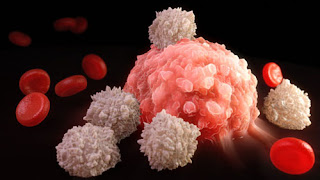 |
| This is a picture of immune cells (the five white cells) attacking a cancer cell. The red "donut like" cells are red blood cells. Acknowledgment: http://axisorigin.com/hkane/?tag=cell |
One of the most eye-opening experiments done which illustrate the relationship between stress and cancer was published in the journal Science.
In this study, three groups of rats were injected with cancer cells. In the "stress" group, the rats were given electric shocks which they could not escape. In another "stress" group, the rats were also given electric shocks but these rats were given a button they could push to stop the shocks.
- In the group that did not receive electric shock, 54% were able to reject the cancer.
- In the group that received electric shocks but had no way of escaping the shocks, only 23% could reject the cancer cells.
- Surprisingly, in the group that received electric shocks but were able to push a button to do something about the shock, 63% were able to reject the cancer.
There is no exact translation of this study in human terms. But here is my translation:
Perhaps, humans don't get "stressed" by receiving random electric shocks in the course of our modern life. However, we do encounter stress on a daily basis by being on the receiving end of unexpected or uncontrolled events. Getting a diagnosis of cancer can be one of these major stress events.
However, as this study shows, our response to this stressful event really makes a difference in our ability to overcome stress or cancer. The group that did not have any control whatsoever over the stressful event fared the worst. However, the group that were able to have some control--even though they still received shocks--did better.
In our lives, we have control over the way we eat and sleep. These are basic things a person with cancer can work on. We have control over the way we talk to ourselves and other people--maybe if we speak more kindly and with more understanding--we make our spirit and our environment less stressful.
We also have a choice on how to relate to our stress--for example, we can quickly spiral into feelings of hopelessness (which may be a natural response initially), but there comes a time when we should also help ourselves get out of these feelings. Maybe this can be done through meditation, or by spending more time with family or friends, or spending more time to do things we truly enjoy. Finally, we can also help ourselves by reframing the situation. Many of my patients say that even though they got hit with a diagnosis like cancer, they were able to focus on the blessings in the situation: they learn to value time with their family, learn to take things more slowly and appreciate what they have, learn to not focus too much on the small unimportant things and instead be thankful for everyday that we are given.
No comments:
Post a Comment